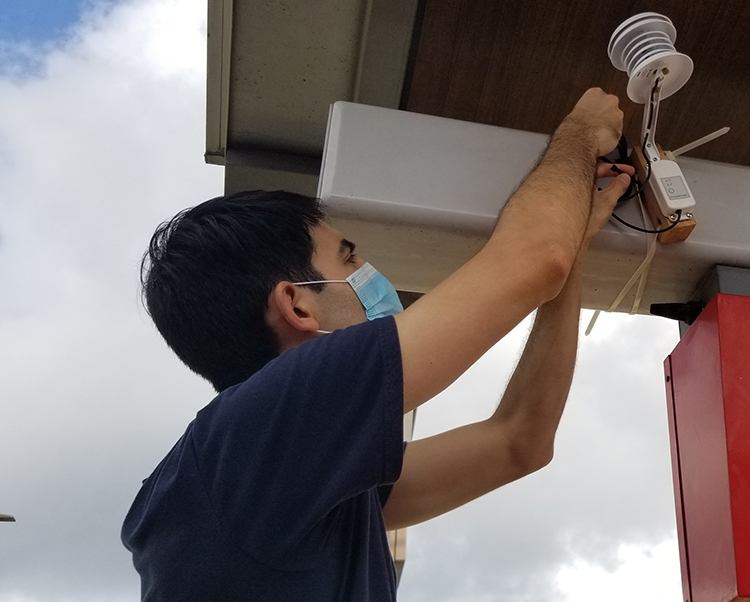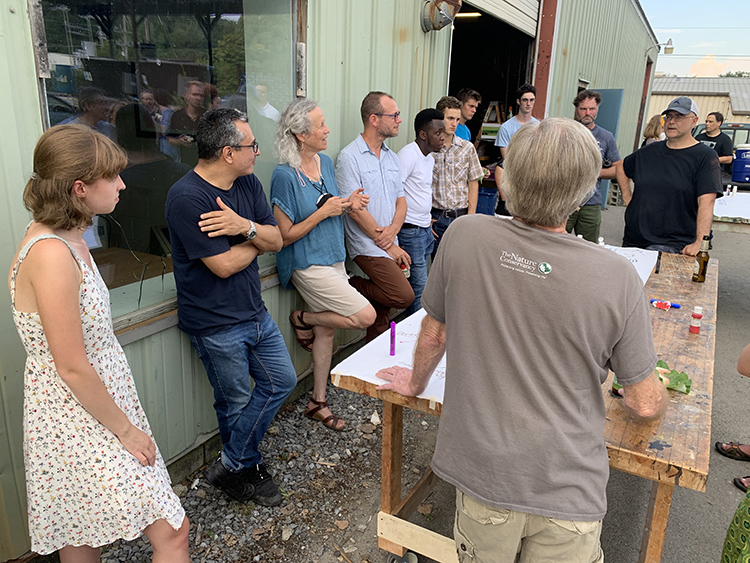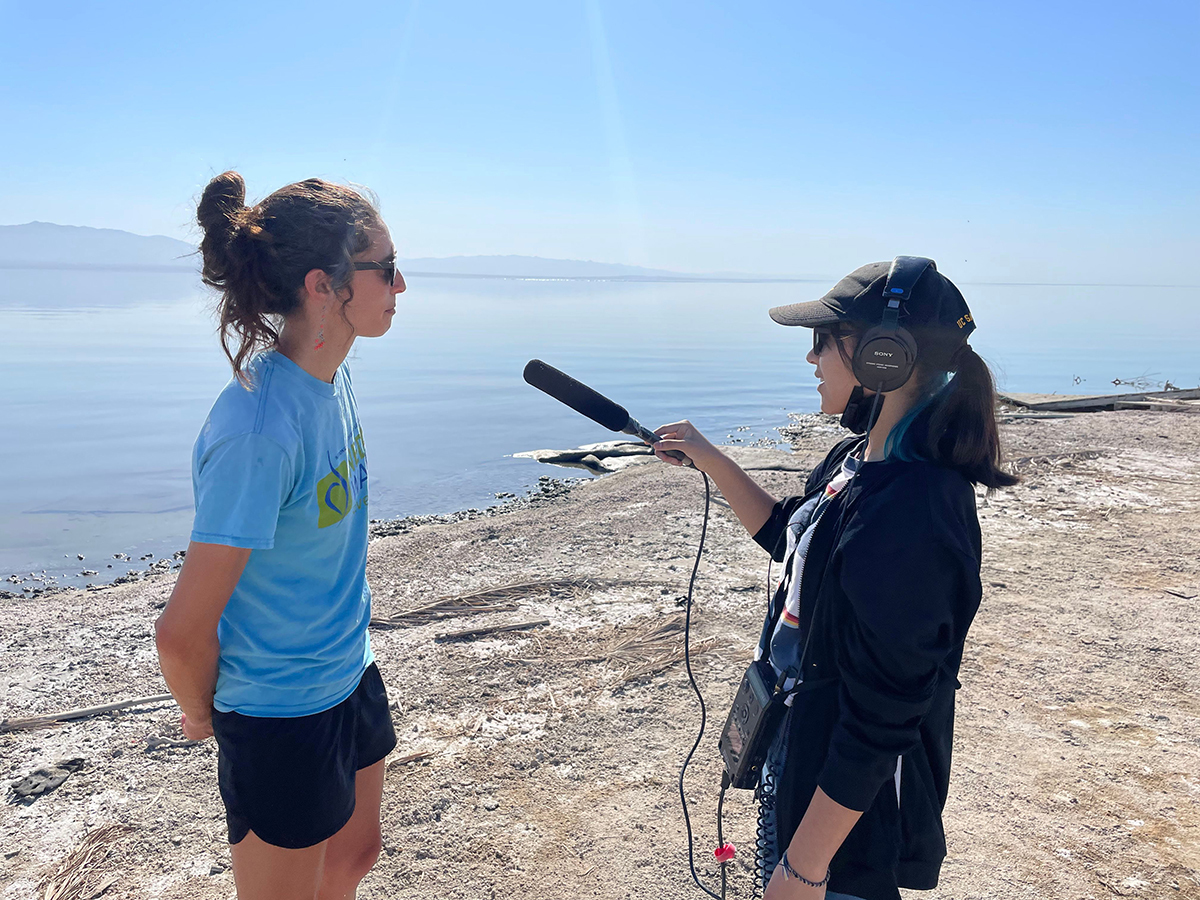Robert Bullard
- We begin this episode talking with Dr. Robert Bullard, often called the father of environmental justice in the U.S. Here's his website.
- And here's a link to the Robert D. Bullard Center for Environmental and Climate Justice at Texas Southern University.
- Here's a bit about the White House Environmental Justice Advisory Council
WEACT for Environmental Justice
- Learn more about the powerhouse New York City environmental group and its co-founder and executive director Peggy Shepard.
- Here's a direct link to the video of the Toxics Are a Drag panel
- Much more about the event, with lots of added information about the participants
- More about Dr. Ami Zota and the George Washington University Milken School of Public Health
Dodge Poetry Program webinar on Poetry and Environmental Justice feat. 'The Sacrifice Zone'
- The Sacrifice Zone film, directed by Julie Winokur
- Geraldine R. Dodge Foundation event: The Sacrifice Zone film screening followed by poetry and conversation about environmental justice. (Please note, the video of the event is blank from about 7:30 to about 43:30 as the attendees watched a special screening of the film. Follow directions on the website for the film to get a link for an individual or group screening.)
- Here's information about the Geraldine R. Dodge Poetry Program and is biennial poetry festival.
- Learn about the Ironbound Community Corporation and its deputy director, organizing and advocacy, Maria Lopez-Nuñez
- Poet Marina Carreira's home page
- Poet Camille Dungy's home page
- Learn more about Dr. Jalonne White-Newsome
Upaya Zen Center
- The July 10, 2021 event on Social and Environmental Justice (Get in touch with the center to see if you can still register for the event and access the video)
- Learn more about Dekila Chungyalpa and the Loka initiative here
- Kritee Kanko's page at the San Francisco Zen Center
- Learn more about Rhonda Magee
- Heather McTeer Toney at Upaya Zen Center
 The University of South Carolina Hazards and Vulnerability Research Institute has developed maps and detailed databases to help government officials, residents and activists track where the greatest economic, health, and real estate vulnerabilities are where they live. The Institute tracks various natural/environmental hazards and evaluates the magnitude of its impact on particularly at-risk populations at a state, county, and even smaller geographic area. So, for example, someone can see where the major heat islands are in their state, and link that impact to a particular racial-ethnic group, households living in poverty, the percentage of the population which is over 65, etc. Staff may be available for speaking engagements and specialized research projects. artsandsciences.sc.edu/geog/hvri/hvri-resources
The University of South Carolina Hazards and Vulnerability Research Institute has developed maps and detailed databases to help government officials, residents and activists track where the greatest economic, health, and real estate vulnerabilities are where they live. The Institute tracks various natural/environmental hazards and evaluates the magnitude of its impact on particularly at-risk populations at a state, county, and even smaller geographic area. So, for example, someone can see where the major heat islands are in their state, and link that impact to a particular racial-ethnic group, households living in poverty, the percentage of the population which is over 65, etc. Staff may be available for speaking engagements and specialized research projects. artsandsciences.sc.edu/geog/hvri/hvri-resources
NAACP’s Environment and Climate Justice team conduct trainings for local and state NAACP leaders on issues such as energy justice, reducing harmful emissions, and community resilience. They also have a sustainable buildings initiative. Trainings and tools can be used to help communities address social inequities from various climate and other environmental vulnerabilities – such as flooding, heat islands, drought, sea level rise, etc. For training and other resources: naacp.org/know-issues/environmental-climate-justice
Return to show notes and credits for this episode.
[Image: Kevin Lanza installs a heat and humidity monitor at a bus stop in Austin. Credit: David Martin Davies]
 There are many local and national organizations and coalitions working hard to transform U.S. cities and towns through a combination of policies which simultaneously advance social justice and climate justice. Here are just a few:
There are many local and national organizations and coalitions working hard to transform U.S. cities and towns through a combination of policies which simultaneously advance social justice and climate justice. Here are just a few:
Emerald Cities takes a “high road” approach to greening cities, aiming to make them more sustainable, resilient in the face of climate change, economically just and democratic. Staff work with government officials, non-profit groups, unions, and the business community to help advance particular policy projects in particular locales. They offer various toolkits on-line and have recently unveiled a new program to work with cities on facilitating building electrification, a strategy mentioned in this podcast. emeraldcities.org
Democracy Collaborative sees as its mission building a democratic economy – one which promotes racial justice, economic equity, and a sustainable planet. They describe themselves as a “research and development lab” which addresses financing, business development, and public policy. One major example of site-specific work has been the creation of Evergreen Coops in Cleveland, a set of interrelated cooperative businesses which address local healthy food needs, enable returned citizens to find much needed jobs and own their own homes -- thus reviving a troubled neighborhood, and build clean local energy sources. democracycollaborative.org; www.evgoh.com
NAACP’s Environment and Climate Justice Program team conduct trainings for local and state NAACP chapters and leaders on issues such as energy justice, reducing harmful emissions, and community resilience. They also have a sustainable buildings initiative. For training and other resources: naacp.org/know-issues/environmental-climate-justice
Reinvest in Our Power (RiOP) A project of the Climate Justice Alliance which is a network of 74 rural and urban frontline communities committed to a just transition to a healthy, equitable, sustainable economy and society. RiOP works on the other side of fossil fuel divestment campaigns – what to do with the freed up money (and possibly land) to transform frontline communities. They have a national Just Transition Loan Fund and specific investment opportunities in particular towns and cities. Climatejusticealliance.org; reinvestinourpower.org
[Image: Luis Aguirre-Torres (second from left), director of sustainability for the City of Ithaca, NY, meets with Cornell University scientists, artists, and students at The Soil Factory maker space. Credit: Jon Miller]
Return to show notes and credits for this episode.
 To learn more about the work of Pueblo Unido which works in the Eastern Coachella Valley on housing, infrastructure, safe drinking water, flood control, health, as well as other community and economic development issues, consult: pucdc.org.
To learn more about the work of Pueblo Unido which works in the Eastern Coachella Valley on housing, infrastructure, safe drinking water, flood control, health, as well as other community and economic development issues, consult: pucdc.org.
The Pesticide Action Network of North America (PAN-NA) is one of five regional PAN offices around the world geared to providing information on pesticides and supporting local and international organizing and policy advocacy to protect farm workers’ health and the health of rural communities, consumer and labor rights. To obtain help or support their campaigns: www.panna.org.
Mom’s Clean Air Force is a national organization with chapters in 25 states and Washington DC. They work on both national and local projects to reduce air pollution, fight climate change and improve children and family health. In partnership with GreenLatinos, they created EcoMadres to specifically organize in Latinx communities and work places. www.momscleanairforce.org/ecomadres.
Water Equity and Climate Resilience Caucus is a national network of organizations across the US working to ensure everyone has affordable access to reliable, safe/clean drinking water. They have worked to bring to public attention to the fact that access to water is a human right recognized by the United Nations, and to ensure that this need is covered in federal infrastructure plans. For more information: climatewaterequity.org.
[PHOTO: Rosa Gonzalez interviews Isabel Arzeno Soltero, an oceanographer at U.C. Irvine about the Salton Sea. Credit: Molly Peterson]
- Resources for 'Health, Wealth & Race in Today's Louisiana'
- Resources for 'Agent Orange Plight in Florida'
- Resources for 'Environmental Justice for Non-Recognized Tribes'
- Resources for 'Living with Lead'
- Resources for 'The Klamath Water Wars'
- Resources for 'Fire and Rain: Living Downstream Reports from Borneo'
- Resources for 'Smackdown: City Hall vs. Big Oil'
- Resources for 'Uranium: Toxic Legacy at Red Water Pond Road'
- Resources for 'Birthplace of Environmental Justice'
- Resources for 'Trailer Park Activists of Coachella Valley'
- Resources for 'Firing Forests to Save Them'
- Resources for 'Forgotten Civilians of Eglin Air Force Base'
- Living Downstream Resource Guide
Northern California
Public Media
Newsletter
Get the latest updates on programs and events.

 Live Radio
Live Radio